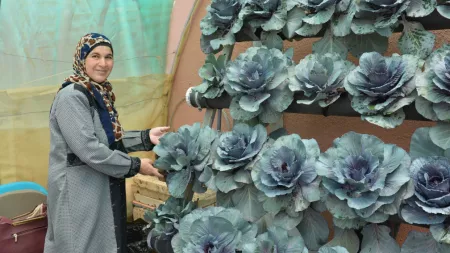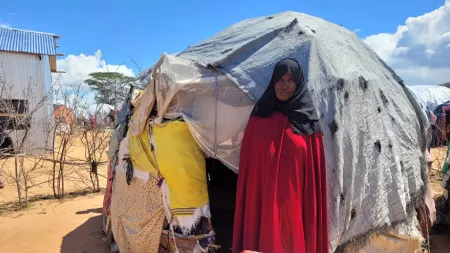Geneva, June 19, 2023 - On the eve of World Refugee Day, CARE International warns that financial support for millions of refugees worldwide has overwhelmingly failed to materialize since the beginning of 2023. Almost six months into the year, the global funding level for the refugee response stands at only 22 percent of the requested 10 billion US dollars for 2023, according to the Refugee Funding Tracker.
“Millions of people have been forced to leave their homes due to conflict and natural disasters, with large numbers finding refuge in some of the world’s poorest countries,” said Delphine Pinault, CARE United Nations Geneva Representative. “At a time of multiple crises driven by conflict, climate change, economic instability, and rising inflation, we call on the international community to live up to its commitments and immediately increase funding to care for and support all refugees and other displaced people, no matter where they come from or where they are fleeing to. Women and children constitute the majority of the displaced worldwide and face high protection risks, including gender-based violence, trafficking, and various forms of exploitation and abuse when displaced.”

There are currently more displaced people worldwide than ever before. Almost 110 million have been forcibly uprooted, with a majority being internally displaced. The countries hosting the most refugees are Türkiye (3.6 million), Iran (3.4 million), Colombia (2.5 million), Germany (2.1 million), and Pakistan (1.7 million).
For the past 30 years, Kenya’s Dadaab has been home to one of the largest refugee settlements in the world. Due to funding cuts, each refugee now receives only 80 percent of the recommended food rations. Without adequate funding, the rations could reduce even further. “Children sleep under the open sky because there is not enough space in the makeshift shelter their parents built for the family out of old clothes and branches,” said Sarah Easter, CARE Emergency Communications Officer. “The camp is overcrowded and houses three times the number of people it was meant for. There is not enough funding for Dadaab. Media attention is waning and donations are drying up. That‘s why many families in Dadaab go to sleep hungry every night.”
"The international community needs to address the roots of displacement—including armed conflict and climate—and help communities become more resilient,”said Ms Pinault.
Funding refugee response is essential, but it is far from enough. Ms Pinault asserts that “governments need to deliver on their climate financing commitments from the Paris Agreement and prioritize investments in gender transformative adaptation in fragile contexts and at the local level. Otherwise, families will continue being uprooted from their homes, and numbers of displaced people will continue growing with women, girls, and children bearing the brunt of our collective failure year after year.”
For media inquires please contact Iolanda Jaquemet, CI Secretariat Senior Humanitarian Communications Coordinator, via: [email protected]
Notes to editors:
- CARE works in more than 100 countries and is committed to promoting gender equality and empowering women and girls in crises.
- In Colombia, since women and girls remain the most vulnerable groups in crisis, CARE focuses its response on protection, specifically in gender-based violence prevention, mitigation, and response, as well as providing sexual and reproductive health services, reaching more than 35,000 people over the past year.
- In Germany, CARE supports refugees through the educational program, Kiwi, with school starter-packages (10,565 delivered) as well as assistance for third-country nationals through partners.
- In Kenya, CARE supports 149,000 refugees in two camps with food distribution and 375,000 refugees across four camps with water and sanitation.
- In Pakistan, CARE works in the provinces of Khyber Pakhtunkhwa and Balochistan to enable refugees and displaced persons to become productive members of their host communities, with a primary focus on income generation livelihood opportunities, empowering refugees and returnees (children and adolescents included) through increased access to inclusive, equitable and quality education, as well as the improvement of psychosocial well-being for the most vulnerable Afghan refugees and Pakistani children in schools.
- In Türkiye, CARE has a wide range of services and support for refugees and host communities, responding both to the February 2023 earthquake as well as to longer-term refugee needs as a consequence of the Syria conflict. CARE’s programs include protection services, food security, women’s economic empowerment, water and sanitation, and shelter as well as wider programs aimed at supporting the integration of refugee and host communities.
